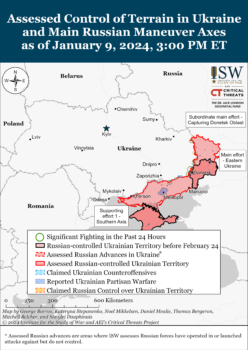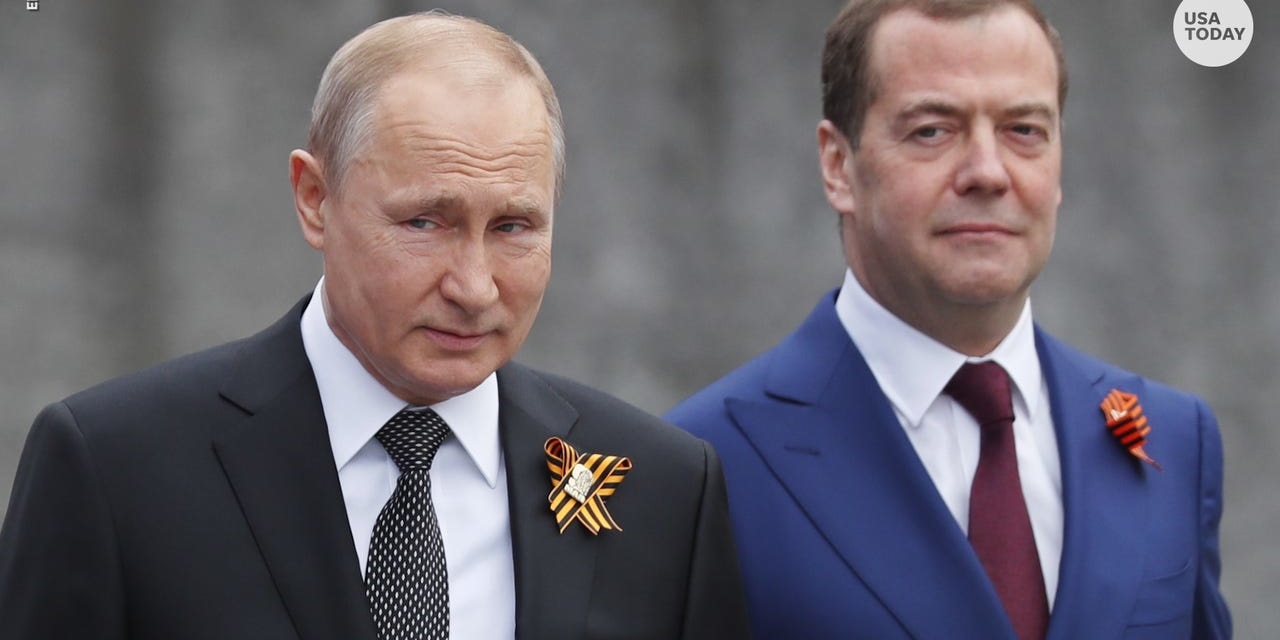Vladimir Putin and former Russian President Dmitry Medvedev (File)
Wednesday’s Coverage: Zelenskiy and A Call for Unity at Davos

Map: Institute for the Study of War
UPDATE 1505 GMT:
Ukraine has bought six Caesar self-propelled howitzers from France, with Paris planning to donate another dozen to Kyiv.
French Defense Minister Sebastien Lecornu said France is also sending 50 precision-guided missiles a month.
He noted that the manufacturer of the Caesars, Nexter, halved the production time of the howitzer to 15 months. About 78 units will be available this year.
Ukraine, which currently has 49 Caesars supplied by France and Denmark, bought six for €3 million to €4 million ($3.3 million to $4.4 million) each.
France will devote €50 million from a fund it created for Ukraine to pay for the further 12 Caesars.
Lecornu hopes allies will buy 60 Caesars for about €285 million: “We want to share the bill and enable European countries to share the financial burden.
I spoke with @EmmanuelMacron to thank France for launching the artillery collation for Ukraine and committing to produce dozens of “Caesars” and ammunition for them in 2024.
We discussed in detail the battlefield situation, Ukraine's priority defense needs, including items for…
— Volodymyr Zelenskyy / Володимир Зеленський (@ZelenskyyUa) January 18, 2024
French President Emmanuel Macron will visit Ukraine in February to complete a deal for Paris to deliver more sophisticated weaponry, including long-range cruise missiles, and to establish long-term political, aid, and reconstruction commitments.
UPDATE 1428 GMT:
A Ukrainian military official says a drone attack has struck an oil terminal in St Petersburg, the first aerial assault on Russia’s second city during Vladimir Putin’s invasion of Ukraine.
The source said the strike demonstrates that “military facilities in St Petersburg and Leningrad Oblast are within reach of Ukrainian forces”.
The Russian Defense Ministry claimed a Ukrainian drone was intercepted over the Leningrad region. Russian Telegram channels reported that a drone was shot down over the St. Petersburg Oil Terminal on the Gulf of Finland, with the exploding UAV setting a fire.
UPDATE 0844 GMT:
Defying Russia’s blockade and attacks on its ports, Ukraine has almost returned grain exports via the Black Sea to levels before Vladimir Putin’s February 2022 invasion.
Leonid Kozachenko, chairman of the Ukrainian Agrarian Confederation, said in a radio interview, “On average, we exported 7.5-8 million tons of grain monthly. Now we have crossed this threshold, and this means that capacity has almost been restored.”
Kozachenko cited the success of Ukrainian strikes on Moscow’s naval forces and the establishment of a “protected corridor” for shipping to break the Russian blockade.
The situation is further improving because of four companies insuring transportation, reducing the cost to 1.25% of cargo compared to 7% earlier in the Russian invasion.
UPDATE 0819 GMT:
Turkish banks are “universally” refusing to work with Russian counterparts, according to the Russian outlet Kommersant.
Quoting sources, Kommersant cited an increased fear among the Turkish banks of US secondary sanctions. On December 22, the US Treasury authorities authorized the restrictions on any financial institution facilitating evasion of sanctions on Moscow.
At least two China State-owned banks have ordered reviews of their business with Russian clients, preparing to halt any transanctions with sanctioned Russian entities and those linked to Moscow’s defense industry.
UPDATE 0650 GMT:
The Ukraine Air Force says air defenses downed 22 of 33 Iran-made attack drones fired by Russia overnight.
The UAVs were launched from Russia’s Primorsko-Akhtarsk area and the Kursk region. The Russians also attacked with two S-300 anti-aircraft guided missiles from the Belgorod region.
UPDATE 0646 GMT:
Russian forces have killed a woman and wounded another civilian in their latest shelling of the Kharkiv region in northern Ukraine.
Governor Oleh Syniehubov said the woman was slain in two Russian strikes on Chuhuiv. She was a boiler room operator in an educational institution which was damaged.
At least 17 people were injured in Kharkiv early Wednesday by two Russian S-300 missiles.
ORIGINAL ENTRY: Dmitry Medvedev, Russia’s former President who is now Deputy Chair of the State Security Council, has reiterated that the “cancerous growth” of Ukraine must be “eliminated”.
Medvedev, a megaphone for Vladimir Putin’s 23-month invasion, issued the threat in a mini-essay on Telegram, “Why Ukraine is Dangerous for Its Residents.” He claimed that “the presence of an independent state on historical Russian territories” is a “constant reason for the resumption of hostilities”.
Ukraine would never be a legitimate state regardless of who is President. Thus Ukraine’s independence is “mortally dangerous” for its people, he declared.
The former President’s statement is the latest expression of Putin’s justification for the February 2022, set out in a lengthy July 2021 essay and echoed recently by the Russian leader and other senior officials.
The assertions undermine any claim that the Kremlin has an interest in negotiations to end its invasion, occupation, and attacks on civilian areas as well as on the frontlines.
Medvedev reinforced his portrayal of perpetual invasion by declaring that Ukrainian accession to the European Union or NATO will not prevent future attacks.
He concluded:
[Ukrainians] will understand that life in one large common state, even one that they don’t much like at the moment, is better than death — their death and the deaths of their loved ones. And the sooner the Ukrainians wrap their heads around this, the better.

